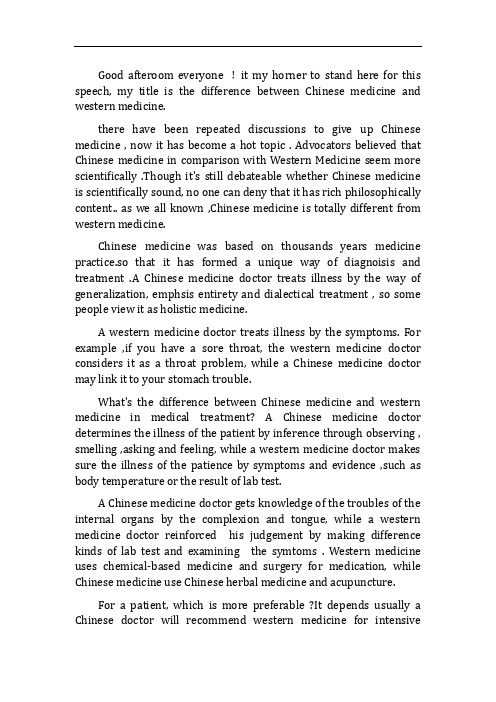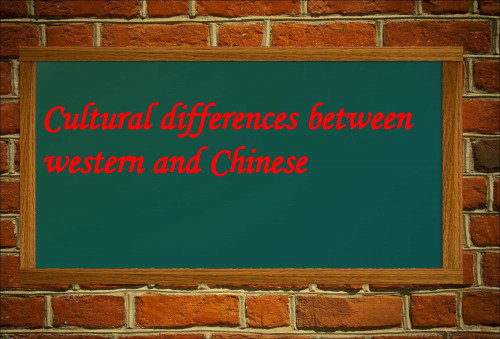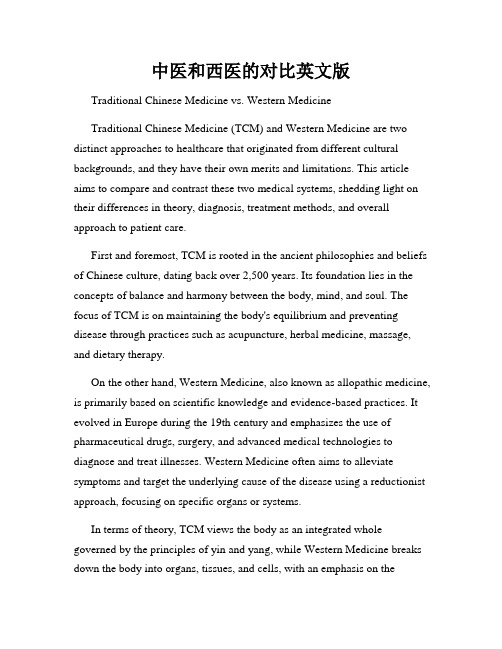传统中药与西药的区别(英文)ppt课件
中医西医区别 English

Good afteroom everyone !it my horner to stand here for this speech, my title is the difference between Chinese medicine and western medicine.there have been repeated discussions to give up Chinese medicine ,now it has become a hot topic .Advocators believed that Chinese medicine in comparison with Western Medicine seemmore scientifically .Though it's still debateable whether Chinese medicine is scientifically sound, no one can deny that it has rich philosophically content..as we all known ,Chinese medicine is totally different from western medicine.Chinese medicine was based on thousands years medicine practice.so that it has formed a unique way of diagnoisis and treatment .A Chinese medicine doctor treats illness by the way of generalization, emphsis entirety and dialectical treatment ,so some people view it as holistic medicine.A western medicine doctor treats illness by the symptoms. For example ,if you have a sore throat, the western medicine doctor considers it as a throat problem, while a Chinese medicine doctor may link it to your stomach trouble.What's the difference between Chinese medicine and western medicine in medical treatment?A Chinese medicine doctor determines the illness of the patient by inference through observing ,smelling ,asking and feeling, while a western medicine doctor makes sure the illness of the patience by symptoms and evidence ,such as body temperature or the result of lab test.A Chinese medicine doctor gets knowledge of the troubles of the internal organs by the complexion and tongue, while a western medicine doctor reinforced hisjudgement by makingdifference kinds of lab test and examining the symtoms. Western medicine uses chemical-based medicine and surgery for medication, while Chinese medicine use Chinese herbal medicine and acupuncture.For a patient, which is more preferable ?It depends usually a Chinese doctor will recommend western medicine for intensivetreatment, and Chinese medicine for recovery. Chinese medicine is more effective for some functional disease ,the cause of which is difficult to make clear.What will happen if Chinese medicine is indeed abandoned? I have no idea of it. For the patientssurffering terminal disease, Chinese medicine is their last resort .It can not only alleviate pain but also offer an option of different treatment.。
中西文化差异(英文ppt)

Differences in education
The gap of teaching system between China and America is big.
• Chinese students always complain about their homework.Too much homework has limited the time to exercise and relax.They try their best to get a high mark.Homework comes the first to them.
• In west countries, people like eating hamburgers, chips, pizza, pasta as their main course, they eat them with vegetable salad, they eat with drinking (water or juice),and they eat with separate plates.
• Western education is more interesting .Teachers pay attentions to training students skills in thinking in realistic life not to emphasis on the importances of memories.
Living style
• Chinese prefer getting up early and sleep early too. We usually go home early and cook meals.
中医和西医的对比英文版

中医和西医的对比英文版Traditional Chinese Medicine vs. Western MedicineTraditional Chinese Medicine (TCM) and Western Medicine are two distinct approaches to healthcare that originated from different cultural backgrounds, and they have their own merits and limitations. This article aims to compare and contrast these two medical systems, shedding light on their differences in theory, diagnosis, treatment methods, and overall approach to patient care.First and foremost, TCM is rooted in the ancient philosophies and beliefs of Chinese culture, dating back over 2,500 years. Its foundation lies in the concepts of balance and harmony between the body, mind, and soul. The focus of TCM is on maintaining the body's equilibrium and preventing disease through practices such as acupuncture, herbal medicine, massage, and dietary therapy.On the other hand, Western Medicine, also known as allopathic medicine, is primarily based on scientific knowledge and evidence-based practices. It evolved in Europe during the 19th century and emphasizes the use of pharmaceutical drugs, surgery, and advanced medical technologies to diagnose and treat illnesses. Western Medicine often aims to alleviate symptoms and target the underlying cause of the disease using a reductionist approach, focusing on specific organs or systems.In terms of theory, TCM views the body as an integrated whole governed by the principles of yin and yang, while Western Medicine breaks down the body into organs, tissues, and cells, with an emphasis on thebiological and molecular level. TCM believes that a disruption in the flow of Qi (vital energy) can lead to imbalances and illnesses, whereas Western Medicine focuses on identifying specific pathogens or abnormalities causing the disease.When it comes to diagnosis, TCM relies heavily on the practitioner's observation skills, including examining the patient's pulse, tongue, and overall appearance, as well as questioning about symptoms and medical history. Western Medicine, on the other hand, employs extensive laboratory tests, imaging techniques, and other technological advancements to provide a more objective diagnosis.Treatment approaches differ greatly between TCM and Western Medicine. TCM treatments often involve a combination of various modalities, such as acupuncture, herbal medicine, moxibustion (burning herbs near the skin), and Tui Na (Chinese therapeutic massage). The aim in TCM is to restore balance and strengthen the body's self-healing abilities. In contrast, Western Medicine relies heavily on pharmaceutical interventions, surgical procedures, and targeted therapies to eliminate pathogens or restore normal bodily functions.In terms of patient care, TCM often takes a holistic approach, considering lifestyle, emotions, environment, and dietary factors in addition to the physical symptoms. TCM practitioners spend more time with patients, providing guidance on self-care and preventive measures. Western Medicine tends to focus more on acute treatments and symptomatic relief, with shorter consultation times in general.It is important to note that both TCM and Western Medicine have their strengths and weaknesses. TCM is often praised for its personalized approach and focus on preventive care, while Western Medicine is renowned for its scientific rigor and advanced technological interventions. In recent years, there has been a growing acceptance and integration of both systems, known as integrative medicine, aiming to combine the best of both worlds.In conclusion, Traditional Chinese Medicine and Western Medicine are two contrasting medical systems with different theoretical foundations, diagnostic approaches, treatment methods, and patient care philosophies. While TCM emphasizes balance, harmony, and natural remedies, Western Medicine focuses on scientific evidence and advanced procedures. It is essential to acknowledge and respect the diversity of medical approaches, as they can complement each other in providing comprehensive and effective healthcare for individuals.。
英文介绍中医药PPT课件

2 Chinese massage was developed over 2,000 years ago and was popular in the Tang, Ming, and Qing dynasties.
The Chinese call this therapeutic bodywork tui na(推拿), 3 which literally means "push" and "pull".
第8页/共10页
Thank you!
1221100071
卓丽宁
2014.4.14
第9页/共10页
感谢您的观看!
第10页/共10页
第2页/共10页
ACUPUNCTURE
ACUPUNCTURE (针灸)
Acupuncture is the insertion of needles (针) into the skin at specific points in order to affect the flow of energy.
2 TCM is based on a belief in yin and yang, defined as opposing energies, such as earth and heaven, winter and summer, and happiness and sadness.
3 The ultimate goal of TCM treatment is to balance the yin and yang in our lives by promoting the natural flow of qi.
中西医文化差异的英文PPT

中西医文化差异的英文PPTTitle: Cultural Differences between Traditional Chinese Medicine and Western Medicine - An English PPTIntroduction:Slide 1: Cultural Differences between Traditional Chinese Medicine and Western MedicineSlide 2: Traditional Chinese Medicine (TCM)Explanation of TCM: Traditional Chinese Medicine dates back thousands of years and is based on the belief in balancing the body's energy or "qi." It encompasses various techniques such as herbal medicine, acupuncture, and massage.Slide 3: Western MedicineExplanation of Western Medicine: Western medicine, also known as conventional medicine, is based on scientific research, diagnosis, and treatment. It primarily focuses on anatomical and physiological factors of diseases and utilizes pharmaceutical drugs, surgeries, and other modern interventions.Cultural Differences:Slide 4: Holistic vs. Reductionist ApproachExplanation: TCM takes a holistic approach by considering the body, mind, and spirit as interrelated elements. Western medicine, on the otherhand, adopts a reductionist approach by analyzing and treating specific symptoms or diseases.Slide 5: Yin-Yang and Qi vs. Anatomy and PhysiologyExplanation: TCM emphasizes the balance between Yin and Yang energies and the flow of Qi. Western medicine emphasizes the study of anatomy and physiology, focusing on the structure and function of organs and body systems.Slide 6: Individualized vs. Standardized TreatmentExplanation: TCM focuses on individualized treatment, considering each person's unique constitution and imbalances. Western medicine often relies on standardized treatment protocols based on scientific research and clinical trials.Slide 7: Natural vs. Synthetic SubstancesExplanation: TCM mainly utilizes natural substances such as herbs and plants for medicinal purposes. Western medicine relies heavily on synthetic drugs and chemical compounds.Slide 8: Prevention vs. CureExplanation: TCM emphasizes preventive measures to maintain overall health and balance. Western medicine often focuses on diagnosing and treating diseases after they have occurred.Impact on Healthcare:Slide 9: Integration of TCM and Western MedicineExplanation: In recent years, there has been a growing recognition of the benefits of integrating both TCM and Western medicine, particularly in countries like China. This includes complementary therapies where patients benefit from the strengths of both practices.Slide 10: Challenges and OpportunitiesExplanation: The integration of TCM and Western medicine presents both challenges and opportunities. These include the need for standardized research and evidence-based practice, cross-cultural communication, and mutual respect for both healthcare systems.Slide 11: Cultural CompetenceExplanation: Healthcare practitioners need to develop cultural competence to understand and respect patients' beliefs and preferences regarding treatment options. This ensures patient-centered care and better healthcare outcomes.Benefits of Cultural Exchange:Slide 12: Mutual Learning and UnderstandingExplanation: Exploring the cultural differences between TCM and Western medicine promotes mutual learning and understanding between different healthcare systems. This allows for the exchange of knowledge, techniques, and advancements.Slide 13: Enhanced Research and InnovationExplanation: Collaboration between TCM and Western medicine encourages research and innovation in both fields. Combined efforts canlead to the development of new treatment options and improved healthcare practices.Slide 14: Global Healthcare ImprovementExplanation: By embracing the cultural differences between TCM and Western medicine, it is possible to improve healthcare practices on a global scale. This can lead to better health outcomes, increased patient satisfaction, and reduced healthcare costs.Conclusion:Slide 15: Embracing Cultural Differences for Better HealthcareExplanation: The cultural differences between Traditional Chinese Medicine and Western medicine provide unique perspectives and approaches to healthcare. By embracing these differences, we can foster a more inclusive and comprehensive healthcare system that benefits individuals worldwide.Slide 16: Thank YouExplanation: Any questions or discussions are welcome.Note: This is a suggested outline for the PPT content. You can expand on each slide according to your preferences and add relevant visuals or illustrations to enhance the presentation.。
英文版中医TCM与西医WesternMedicine的比较

英文版中医TCM与西医WesternMedicine的比较Traditional Chinese Medicine (TCM) and Western Medicine are two distinct medical systems that have been developed and practiced for centuries. While TCM is deeply rooted in Chinese culture and has its own unique theories and practices, Western Medicine is based on scientific evidence and adopts a more systematic approach. In this article, we will compare and contrast the two medical systems.One fundamental difference between TCM and Western Medicine lies in their respective approaches to understanding and treating diseases. TCM views the body as an interconnected system, where imbalances in Qi (life energy) and the flow of Yin and Yang can lead to illness. TCM practitioners diagnose and treat patients holistically, taking into consideration their physical, mental, and spiritual well-being. This often involves the use of herbal remedies, acupuncture, and other alternative therapies.On the other hand, Western Medicine focuses on the scientific understanding of diseases and their causes. Physicians diagnose and treat patients based on scientific evidence, using methods such as laboratory tests, imaging technologies, and prescription drugs. Treatment in Western Medicine often involves targeting specific symptoms or diseases, rather than considering the individual as a whole.Another difference between the two medical systems is their approach to preventive care. TCM emphasizes the importance of maintaining a healthy lifestyle and preventing diseases before they occur. This is achieved throughpractices such as dietary adjustments, regular physical exercises, and stress management techniques. TCM also takes into account the individual's constitution and seeks to balance the body's Yin and Yang energies to maintain health.Western Medicine, on the other hand, places a strong emphasis on early detection and intervention. Regular check-ups, screenings, and vaccinations are recommended to detect diseases at an early stage and prevent their progression. Western Medicine also advocates for healthy lifestyle choices, including a balanced diet and regular exercise, to reduce the risk of developing chronic conditions such as heart disease and diabetes.When it comes to the treatment of acute and severe illnesses, Western Medicine has made significant advancements in surgical techniques and the development of life-saving drugs. Modern medical technologies such as organ transplantation, chemotherapy, and advanced surgical procedures have greatly improved survival rates and quality of life for patients. Western Medicine also excels in emergency and critical care, with specialized departments and equipment in hospitals to handle complex medical cases.TCM, on the other hand, offers a more holistic approach to chronic conditions and the management of long-term health. The use of herbal remedies and acupuncture has shown promise in treating conditions such as chronic pain, allergies, and infertility. TCM focuses on maintaining the body's balance and restoring harmony, which can help alleviate symptoms and improve overall well-being.In recent years, there has been an increasing interest in integrating TCM and Western Medicine, recognizing the strengths and limitations of eachsystem. This approach, known as integrative medicine, seeks to combine the best elements of both TCM and Western Medicine to provide comprehensive and personalized care to patients. By combining the scientific rigor of Western Medicine with the holistic approach of TCM, integrative medicine aims to offer a wider range of treatment options and improve patient outcomes.In conclusion, TCM and Western Medicine are two distinct medical systems with different philosophies and approaches. TCM emphasizes holistic care and the balance of Qi and Yin-Yang energies, while Western Medicine focuses on scientific evidence and targeted interventions. Both systems have their strengths and limitations, and the future lies in the integration of the two to provide more effective and personalized healthcare solutions.。
中医介绍英文PPT幻灯片课件
hieroglyphs and pictographs documenting acupuncture and moxibustion have been found which are dating back to Shang Dynasty(1600BC-1046 BC).When acupuncture(and herbal medicine)became integrated into an embracing medical theory system,it is difficult to judge.TCM theory is,however,inextricably intertwined with the principles of Yinyangism,which was represented for the first time by Zōu Yǎn(340 BC-260 BC)).
中医介绍英文PPT幻灯 片课件
演讲人
Traditional Chinese Medicine(“TCM”)is an integral part of Chinese culture.It has made great contributions to the prosperity of China.Today both of TCM and western medicine are being used in providing medical and health services in China.TCM,with its unique diagnostic methods,systematic approach,abundant historical literature and materials,
中医和西医的差异[优质ppt]
Acupuncture
Earlist classic of Earlist medicine chinese medicine monograph
theory
TCM&WM
Western Medicine
Ancient Greek
Hippocrates
Western Medicine
Humoralism
• WM keeping pace with times; Be good at induction; Linear rise.
TCM&WM
support of thinking:
TCM: essence, Yin Yang ; five elements theory.
WM: simple Laboratory sheets; Medical Examination Report. parameter of the Professional medical equipment.
Traditional Chinese
Medicine
-------- The name first appeared around opium war
Xia-Shang-Zhou period
Qin-Han period
lquor and decoction
four diagnostic methods
WM:
pathogenic factors or pathological products depending onAccurate diagnosis .
TCM&WM
Conclusion
Comparison
• Traditional Chinese medicine emphasizes the holistic concept and treatment based on syndrome differentiation.
中西医学差异英语ppt
The way of keep health 养生之道
Relatively
strong role in medical treatment of Western medicine is mainly based on drugbased, effective, but side effects 西医主要是以药物等比 较强烈作用的医疗手段 为主、见效快但副作用 大
This
book has leads to another very important point in China — —Health 这本书引出了中国另 一个非常重要的观 点——养生
Chinese
people in particular on health care, including clothing, food, shelter, transportion 中国人对养生特别在意,包括衣、食、住、行
李时珍
Li Shizhen (1518-1593 AD), a famous physician and pharmacologist in the Ming Dynasty, wrote The Compendium of Materia Medica ( Ben Cao Gang Mu ). The book consists of 52 volumes with 1,892 medicinal herbs, including over 10,000 prescriptions and 1,000 illustrations of medicinal items.
First,
let us know about the history under the traditional Chinese medicine and Western medicine
最新中西医学差异英语ppt教学讲义PPT课件
❖ 4. Traditional Chinese medicine with western medicine doctor with traditional Chinese medicine, western medicine to save people.
❖ Relatively strong role in medical treatment of Western medicine is mainly based on drugbased, effective, but side effects
❖ 在西医医疗相对强劲的 作用主要是基于药物, 有效,但副作用强
sclerosis,ALS)
Байду номын сангаас
病因和发病机制
本组疾病的病因和发病机制尚不清楚, 有关假说: ➢ 兴奋毒性(excitotoxicity) ➢ 细胞凋亡(apoptosis) ➢ 氧化应激(oxidative stress)
治疗药物
➢ 随着社会发展和人口老龄化的出现,本组疾 病已成为继心血管疾病和癌症之后, 严重影 响人类健康的第三位因素。
❖ 有钱,你去看西医,没有钱,你去看中医。
治疗中枢神经系统退 行性疾病药
中枢神经系统退行性疾病
一组由慢性进行性的中枢神经组织退行 性变性而产生的疾病的总称。
病理上可见 脑和(或)脊 髓发生神经 元退行变性、 丢失。
➢ 主要疾病:
➢ 帕金森病(Parkinson’s disease, PD) ➢ 阿尔茨海默病(Alzheimer’s disease, AD ) ➢ 亨廷顿病(Huntington disease,HD) ➢ 肌萎缩侧索硬化症(amyotrophic lateral
